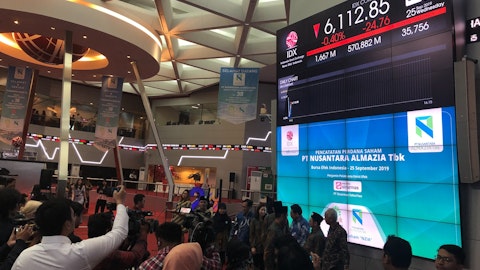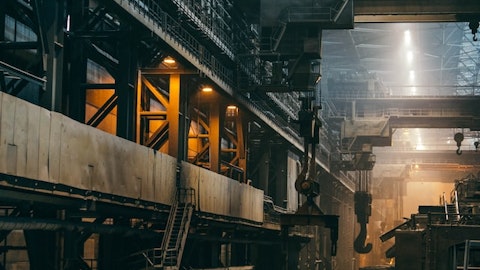Maximo Vedoya: Okay. I mean, demand in Mexico — and I said demand not only in Mexico, but in North America is good. I mean, because it’s very linked North America to Mexico. I mean, in the last several conference call, we were always talking about when the recession is coming. And to be honest, today we don’t see that in the demand. We see healthy demand in both countries, in the US and in Mexico. Mexico is of course driven by industrial production. Construction is a little bit low, and it’s going to be a little bit low, the commercial market for the next probably one or two months before prices settle down and start probably increasing a little bit again. But the money in general, you see activity pretty much good. Of course, I don’t think the increase in consumption is going to be that much as it was in 2023.
The last number of world steel was that demand — the consumption of steel in Mexico was going to grow by 2% more or less. And as I remember in my remarks, it grew up by 14% in 2023. But again, we are seeing healthy demand.
Marcio Farid: Perfect. Thanks a lot.
Maximo Vedoya: I hope that answers all the questions, Marcio.
Marcio Farid: It does. It does. Thank you very much.
Maximo Vedoya: You’re welcome.
Operator: Our last question comes from Caio Greiner from BTG Pactual. Your line is now open.
Caio Greiner: Yes, good morning, everyone. Thank you. So two questions. One quick one on HRC prices in North America. Just wanted to hear your thoughts on what do you think the next short-term move is going to be? Prices are trading at a relevant premium to other regions. I mean, we have been seeing some players trying to announce even further price hikes, but the point is that we’re seeing prices trending down. Even lead times are moving lower. So I just wanted to hear your thoughts on what you think that the next move for HRC prices is going to be. What can we expect for the first quarter and even into the second quarter of 2024? And my second question, guys, on just a broader one on Ternium’s evaluation and corporate simplification.
I remember some time ago, a few years ago, you guys attempted a corporate simplification in Argentina which didn’t really move forward. I just wanted to hear an update on that. I mean, we have a new administration in Argentina. Have you guys been in talks whatsoever with the new president and with the new administration so maybe we can, so Ternium could try and address that issue? And one more thing on corporate simplification may be, do you guys think that Usiminas could also be a part of this in the future? Because when we think about valuation for both stocks, I mean, it’s interesting to see that Ternium, the controller is actually trading at a discount to Usiminas. So when you think about the company’s corporate structure, I mean, there could be maybe some room to simplify all that and try to get a re-rating for the stock.
So I just wanted to hear your thoughts on the latest updates on corporate simplification on those two items. Thank you very much.
Maximo Vedoya: Thank you very much, Caio. I will start with the second one and also if Pablo wants to add something, please do Pablo. And then the first one, Caio. Corporate simplification is still on our agenda, at least on the agenda of Ternium management and the board. We don’t have anything to inform about that yet. We haven’t talked with the new government of this issue. I mean, the government has a lot of things — going on in their hands, the new government. But I think it’s something that at some point this government should be able to analyze. As I always said, this is a transaction that favors Ternium, it favors Ternium Argentina, and it favors the government. So if we reason with that in mind, it should be something that at some point can happen.
But to be honest, we haven’t talked anything like that. Usiminas is kind of different because as you remember, we have an agreement with our partner, Nippon Steel there. And so we are not going to do anything for the next year or year and a half. In the future it could be something. But today I think we are happy on where we are in Usiminas and working to improve Usiminas.
Pablo Brizzio: Yes, Caio. Hi, how are you Caio?
Caio Greiner: Just 1 follow-up on the — Yes, sorry, Pablo. Go ahead.
Pablo Brizzio: No, no, just wanted to say, as you said, we have been discussing this for a very long period of time. Clearly it is part of our strategy, it is in our minds. And as soon as we see the chances to move forward with this, it is clearly something that we consider important for the future of Ternium from different standpoints and clearly evaluation is one of that.
Caio Greiner: Just one follow up on the corporate simplification. I mean, how do you guys view the possibility of delisting Usiminas two years down the road when the agreement with Nippon gets pretty much expires?
Pablo Brizzio: That’s a difficult question to answer, Caio, because not only we have an agreement that Maximo mentioned, that will take some time for us to move forward, then there are other shareholders in Usiminas and the corporate laws and regulations in Brazil are a little particular, so they are quite complicated. We know there are some possibilities of refurbish that regulations, but it’s not something that we are seeing at the moment. As I said, corporate simplification is in our mind, So it’s something that we are always thinking about. But it is not something that we can move forward right now, so it’s very difficult to speculate on that at this moment. Clearly it’s something for us to start to think in the future in relationship to that. The closer one that we have, and hopefully we will have the chance to analyze it more in depth is the Argentine one, which is probably the new government easier to do than in the past.
Caio Greiner: Great. Thank you.
Maximo Vedoya: So hot oil prices in the US, yes, you’re right, Caio, that prices has been coming down in the recent three weeks, in the last three, four weeks. As I said, it’s not a problem of the demand, but it is a problem of imports that are coming mainly to the US and some part also to Mexico. So that’s the main reason. The good news is that demand is still there. And I think this is going to be something that it’s going to stabilize in the near future. I don’t see prices going much further down. As I always said, there is a new floor or a new standard of prices in North America that is around or a little bit higher of 900 at least. So I don’t think prices are going to change. Again, because the demand is there, and we know imports for the following months, in May, June, July, are coming much more lower. So I am positive about that.
Caio Greiner: Thank you very much, guys.
Maximo Vedoya: You’re welcome, Caio.
Operator: We don’t have any pending questions as at the moment. I’d now like to hand back over to Ternium’s CEO for closing remarks.
Maximo Vedoya: Okay, thank you again all for participating in today’s call. As usual, please feel free to contact us for any questions or comments. Thank you very much and goodbye.
Operator: Ending today’s call. Have a wonderful day.
Follow Ternium S A (NYSE:TX)
Follow Ternium S A (NYSE:TX)
Receive real-time insider trading and news alerts



